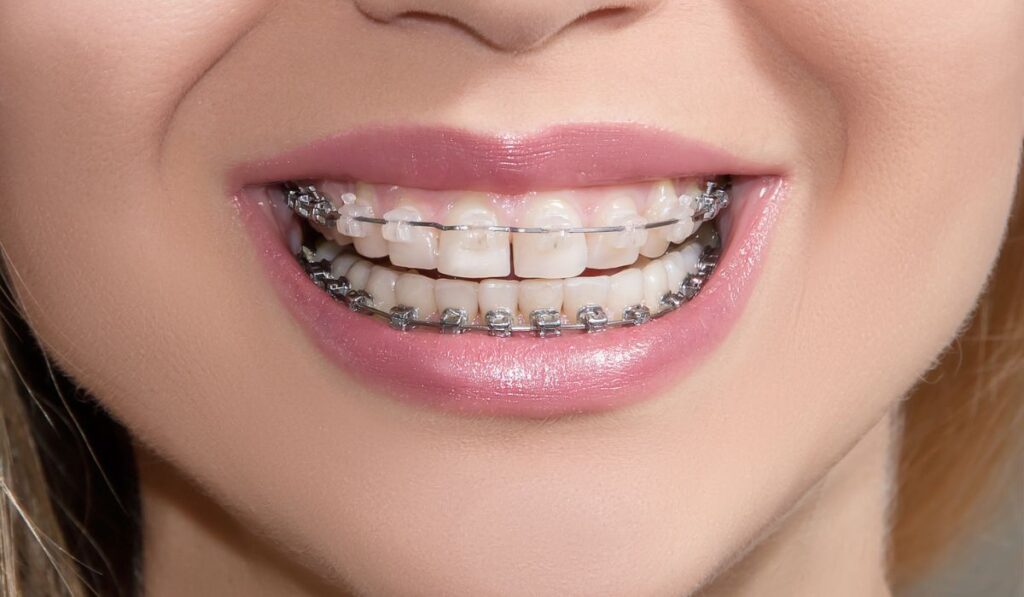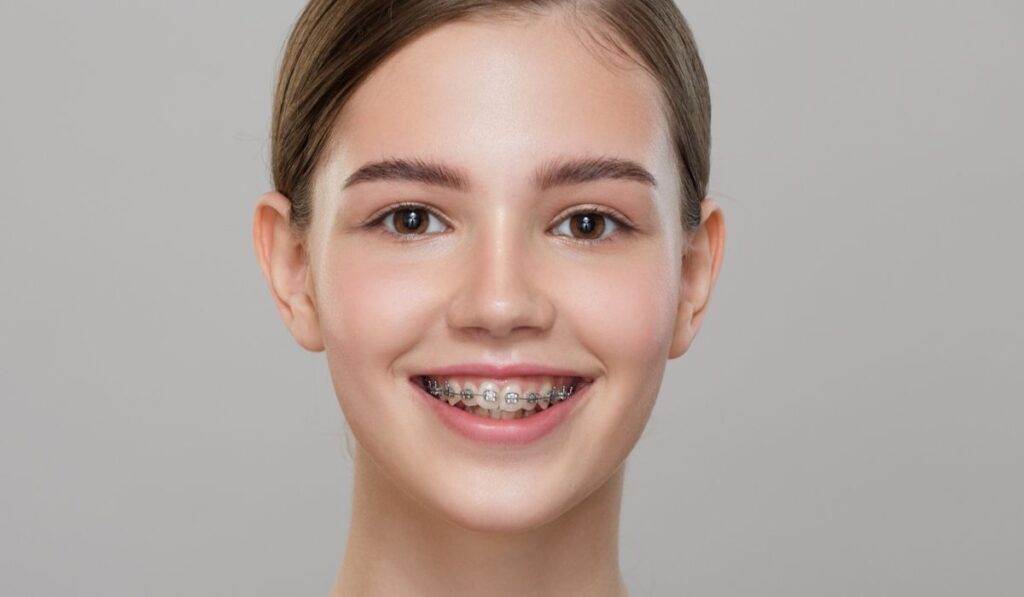Do you want to get braces, but the myths and random horror stories you have heard about them are holding you back? Worried your braces will get rusted while fixed to your teeth? Or that you will get hit by lightning while wearing them? Or the worst of all, that the metal detectors in the airport will go off on the way to your vacation? Oh, the horror!
Braces do not rust because every part is made of non-corrosive materials such as stainless steel or other similar alloys. Every braces manufacturer has to undergo strict regulations and clinical trials before releasing their products to the public.
Rest assured, none of those things will happen. All these are myths, misconceptions, and misunderstandings. So let’s sort facts from fiction and address ten common myths about metal braces with proper explanations for why you should not believe them.
Myth 1: Braces Rust

Braces do not rust.
It is natural for our minds to wonder how metal and water can be together without the metal getting rusted eventually. Thankfully, the kind of metals used in making braces is chosen for their nature not to rust even if you wear them for longer than two or three years, depending on the nature of your treatment.
Most braces are made of titanium or iron alloys, often combined with nickel and chromium. Rust is a form of oxidation, and these special orthodontic metals and alloys do not oxidize like regular metals.
Myth 2: You Can’t Play a Musical Instrument with Braces
You can play any brass or woodwind instrument with little practice and adjustment while wearing braces.
If you have been playing an instrument before getting your braces, you do not have to worry about giving it up. However, if you play an instrument, there might be an adjustment period since you may have to adopt new techniques to navigate the extra hardware in your mouth.
Woodwind instruments such as clarinet and the saxophone are relatively easier to work with. If you are a brass instrument player such as the trumpet, there might be a longer adjustment period, but you can still make it work.
In fact, the restriction that you get from braces may push you to perfect your techniques and improve your skills even more.
Myth 3: You Can’t Play Sports with Braces
With a properly fitted mouthguard, you can play any sport, including contact sports, while wearing braces.
Student-athletes and their parents worry they will have to stop playing sports to avoid the risk of a severe mouth injury while on the field. All you have to do to ease this worry is to take precautions to protect your teeth and braces.
In fact, for those in contact sports or other sports with an increased risk of injury, it is necessary to wear mouthguards to be protected, so there will not be much difference.
Myth 4: Your Teeth Will Be Straight Forever After Wearing Braces
Unless you regularly wear retainers as recommended by your orthodontist, there is a risk of your teeth moving back to their original positions eventually.
Your braces work by putting consistent pressure on your teeth and the jawbone to align more desirably slowly. Then, they hold the teeth firmly in place until your treatment is complete.
Once you take your braces off, there is a natural settling process where teeth try to move back to where they are. This is why you must wear retainers after getting your braces off. To put it simply, “shift” happens naturally—you need to have the preventive measures in place so it does not happen to you!
Myth 5: Braces Will Set Off a Metal Detector
Braces do not have enough metal to set off a metal detector.
This is one of the most common myths out there and reasonably valid concern to have. Rest assured, your braces will not set off security metal detectors. They are designed to catch dangerous items with higher metal content, such as knives or other steel weapons, or even firearms.
Your braces, made of lightweight alloys which often have a lesser metal content than coins, are of no concern to the heavy-duty metal detectors you go under when you are in the airport.
Myth 6: Braces Can Interfere with Radio or Electronic Devices
No, the metals used in making metals do not conduct radio or other digital signals.
This misconception has happened mainly because the metal used in braces look eerily similar to the metals in antennas. Therefore, some believe their braces would make them respond to radio signals or even interfere with their electronic devices. This does not happen.
The mere presence of any random metal does not interfere with radio or other signals. You need tank circuits, amplifiers, inductors, and all kinds of devices to do that.
So, unless you walk around with a radio worth of little electrical objects connected to your metal braces, you do not have to worry about becoming a human radio or a WiFi router!
Myth 7: Braces Make it More Likely You Will Be Struck By Lightning
No, your chances of getting struck by lightning do not increase if you wear braces.
This might sound ominous, but wearing braces will not increase or decrease your chances of getting struck by lightning. Your chances of getting hit by lightning are about 1 in 700,000 in the US. This number stays the same for those who wear braces as well.
So, just make sure you do not stand on top of a mountain when it is raining (you should not be doing this even if you are not wearing braces!), and you should be good! Jokes aside, follow safety procedures such as staying indoors when it’s raining.
Myth 8: Braces Will Always Hurt
No. Properly fixed braces may feel uncomfortable initially, but there should be no pain at any point in the treatment of dental braces.
If any pain is involved, it is only when your orthodontist fits your braces for the first time or when you get your braces routinely tightened. If you have pain from the parts of your braces poking inside your mouth, you can use orthodontic wax to soften that surface. If it is persistent, meet your orthodontist to fix the placement of your braces.
Some people think braces have to hurt for them to work. This is also untrue. A good dental braces treatment involves applying consistent but gentle pressure to your teeth, slowly guiding them to align straight over months.
Myth 9: Braces are Only for Kids and Teens

No, there is no age limit for getting beautiful results with braces.
With proper orthodontic treatment, your teeth can move in the way you desire at any age. For adults, it is often not only about getting straighter teeth. Some adults have their teeth shifted or crowded when they get older, which can be treated with braces.
It is an effective way to get rid of headaches or ear aches that come due to problems with teeth or bite issues. Even if it is just for cosmetic reasons, you are never too old to get a picture-perfect smile!
Myth 10: Braces Take a Long Time
The average length of treatment for braces is about 16-18 months, which is not that long considering the lifetime impact of the results it brings.
All orthodontic treatments are fully customized to each person. Therefore, simply because someone else had to wear their braces for over two years does not mean you do.
However, you need to be careful with promises from some service providers that you will get a straight smile in a set amount of time. Unfortunately, that is not how orthodontic treatments happen.
The length that it will take for you to fix any specific bite issues or other dental malocclusion is unique. It depends on how severe the problem is and how fast and effective your teeth respond to the treatment.
No matter the duration it takes, however, excellent orthodontic treatment is always worth it!


